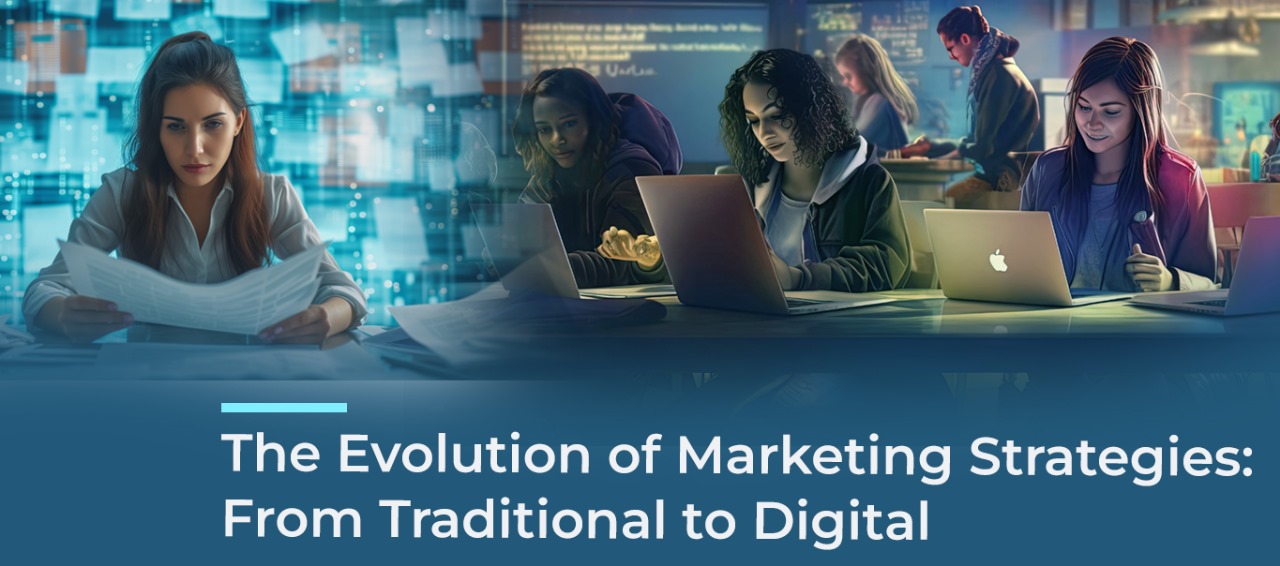Over the past few decades, marketing methods have experienced a considerable upheaval. With the development of the internet and technology, businesses are now more focused on digital platforms than on traditional marketing strategies. The way businesses interact with their audience has changed as a result of this progress, making more specialized and individualized strategies possible. This blog will examine the evolution of marketing tactics from conventional to digital, emphasizing significant turning points and the effects on enterprises.
- The Era of Traditional Marketing
- The Rise of Digital Marketing
- Enter the Digital Age
- Data Analytics and ROI
- Content Marketing
- Social Media Marketing
- Personalization and Targeting
- The Mobile Revolution
- Globalization and Localization
- Ethical and Sustainable Marketing
Traditional marketing encompasses conventional methods of reaching out to consumers, such as print ads, billboards, television commercials, radio spots, and direct mail. These tactics were once the primary means of promoting products and services, relying heavily on mass media to reach a broad audience. While traditional marketing played a crucial role in building brand awareness, it lacked the ability to precisely target specific demographics and measure the effectiveness of campaigns.
The development of the internet was a major game-changer for the marketing industry. Digital marketing makes use of online platforms and channels to communicate with customers in a more engaging and quantifiable manner. Websites, social media, email, and search engines all proliferated, giving businesses access to a plethora of data that they could use to customize their marketing campaigns based on consumer preferences and habits.
With the advent of the internet and the rapid growth of technology, the marketing landscape underwent a seismic shift. Digital marketing emerged as a game-changer, offering businesses unprecedented opportunities to connect with consumers in more personalized and measurable ways. From websites and social media to email campaigns and search engine optimization (SEO), digital channels opened up a world of possibilities for marketers to engage with their target audience.
The best way to predict the future is to create it.
Data analytics play a crucial role in measuring the effectiveness of marketing campaigns and optimizing strategies for maximum ROI. By analyzing key metrics such as website traffic, conversion rates, and customer demographics, marketers can make data-driven decisions to continually improve their efforts.
Content marketing has emerged as a cornerstone of digital marketing strategies, focusing on the creation and distribution of valuable, relevant content to attract and retain audiences. By providing informative and engaging content, businesses can establish themselves as industry authorities and build trust with their target customers.
Social media platforms have become indispensable tools for marketers to connect with audiences, build brand awareness, and drive engagement. Leveraging the power of social media requires a strategic approach, including consistent branding, targeted content, and active engagement with followers.
One of the key advantages of digital marketing is the ability to personalize messaging and target specific audience segments. Through data-driven insights and analytics, marketers can tailor their campaigns to individual preferences and behaviors, resulting in higher engagement and conversion rates.
The proliferation of mobile devices has had a profound impact on marketing strategies. With more consumers accessing the internet and engaging with content on their smartphones and tablets, marketers must prioritize mobile-responsive design and optimize their campaigns for a seamless mobile experience.
As businesses expand their reach beyond domestic markets, globalization and localization play a pivotal role in marketing strategies. While globalization allows businesses to reach a broader audience and tap into new markets, localization involves tailoring marketing efforts to specific regions, languages, and cultural nuances. This may include translating content, adapting messaging, and understanding local market preferences to resonate with diverse audiences around the world.
In an era of heightened social consciousness, ethical and sustainable marketing practices have become increasingly important. Consumers are increasingly prioritizing brands that align with their values and demonstrate a commitment to social responsibility and environmental sustainability. Marketers must be transparent, authentic, and socially responsible in their communications, taking into account the ethical implications of their actions and ensuring they contribute positively to society and the planet.
The shift in marketing tactics from traditional to digital has completely changed how companies interact with customers and advertise their goods. Although there is always a place for traditional approaches, digital marketing provides unmatched targeting, engagement, and measurement possibilities. Marketers need to keep up with new developments in technology and modify their approaches to match the changing demands and tastes of their target audience. Businesses may maintain their competitiveness in an increasingly digital world and promote long-term success by adopting digital marketing strategies.






